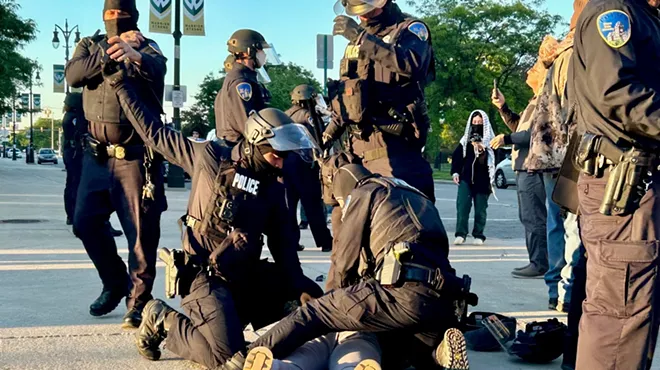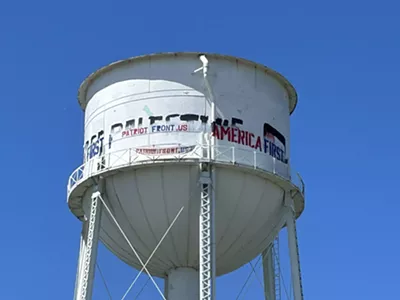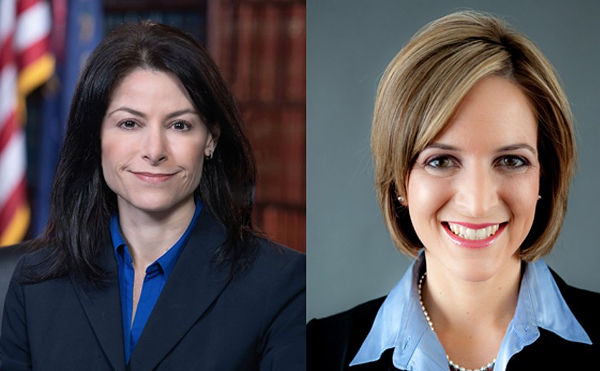Wayne State faculty demand President Espy’s resignation after student protest encampment raid
One professor says the violence against students will be 'a tragic and dark stain in the history of this institution'
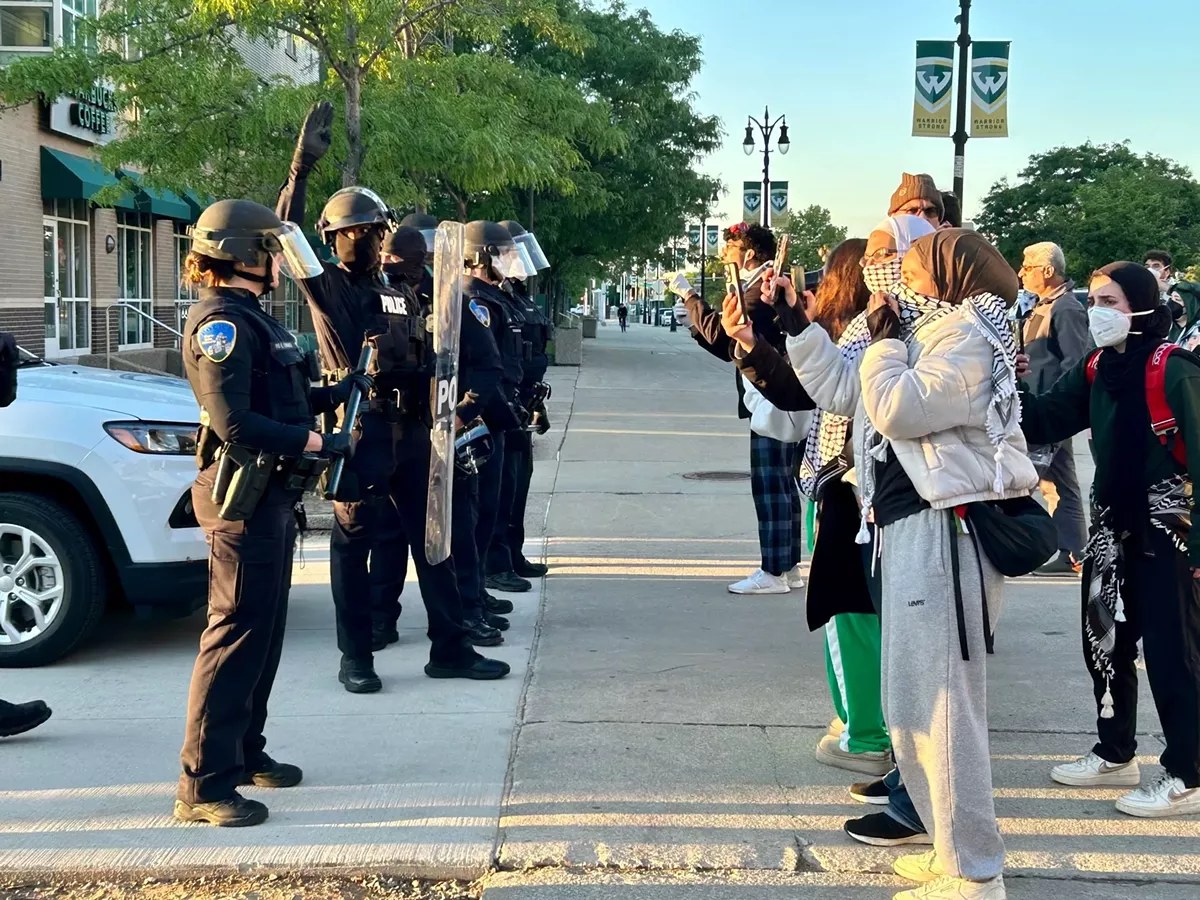

Audio By Carbonatix
[
{
"name": "GPT - Leaderboard - Inline - Content",
"component": "35519556",
"insertPoint": "5th",
"startingPoint": "3",
"requiredCountToDisplay": "3",
"maxInsertions": 100,
"adList": [
{
"adPreset": "LeaderboardInline"
}
]
}
]
Some Wayne State University faculty and staff members are calling on President Kimberly Espy to resign after authorizing police to raid a student protest encampment on campus.
WSU cops cleared out the encampment Thursday morning and used force to prevent the anti-war activists — tuition-paying students — from returning to campus. Police tackled some of the protesters and tore off at least one woman’s hijab, even as the demonstrators were following the cops’ orders. About 11 activists were arrested.
It was the second time in a little over a month that police used force to handle peaceful protesters on campus. At a WSU Board of Governors meeting on April 26, university police also pushed and yanked activists out of the public space for chanting, “We will not rest, until you divest.”
“This is the second time that Espy has sat silent while her police force has directly targeted women and unleashed violence against them,” Bryan Victor, professor of social work, tells Metro Times. “Police forcibly removed a hijab that one of the protesters was wearing. We have lost all confidence in Espy’s capacity to lead.”
Metro Times interviewed more than a dozen faculty and staff members, some of whom spoke on condition of anonymity because of fears of reprisal.
They are considering organizing a no-confidence vote to pressure Espy to resign and to send a message that her actions were unjustified and immoral.
“Wayne State’s actions were deplorable, disgusting, inappropriate, vile, and repugnant,” a professor in the College of Fine and Performing Arts says. “Pick any descriptor and it applies. Siccing the cops on students who are literally resisting and protesting a genocide demonstrates that the president lacks the moral clarity to do her job. She should step down. She’s not equipped to handle her responsibilities.”
Activists set up the encampment on May 23 to call on the university to divest from companies connected to Israel. Espy agreed to meet with a limited number of activists if they abandoned the encampment on Memorial Day. The activists countered the request, saying they would meet Espy on their terms.
In response to Thursday’s crackdown, a group of WSU workers also launched the Faculty & Staff for Justice in Palestine, an initiative that is part of a larger movement with more than 100 other groups on campuses across the country.
“The FSJP stands in solidarity with our students and seeks to protect them from harassment, discrimination, and punishment,” a statement reads. “We are dedicated to reclaiming and protecting academic freedom and free speech within our university, which have become battlegrounds in the propaganda war against Palestinian freedom advocates. We will work in close collaboration with colleagues in Palestinian universities and other universities around the world, supporting public education about the ongoing Nakba and endorsing the principles of Boycott, Divestment, Sanctions (BDS).”
After police forcibly removed activists from a public Board of Governors meeting in April, more than 100 faculty and staff members denounced the “racist assault” and “McCarthyite repression against students.”
Professors accuse the university of exploiting diverse students as a recruiting tool, only to treat them unfairly on campus.
“The university uses images of many of these students in their promotional materials,” Shannan Hibbard, a professor in the Department of Music, says. “The university literally uses the faces and images of these students that they unleashed violence on and brutalized. I know many of these students personally, and I am disgusted by this.”
Faculty and staff members also admonished Espy for resorting to force to handle peaceful students who only want their voices to be heard. They point to the brutal crackdowns at other colleges, including the University of Michigan, saying Espy should have known that the encampment crackdown would further inflame tensions and demoralize students.
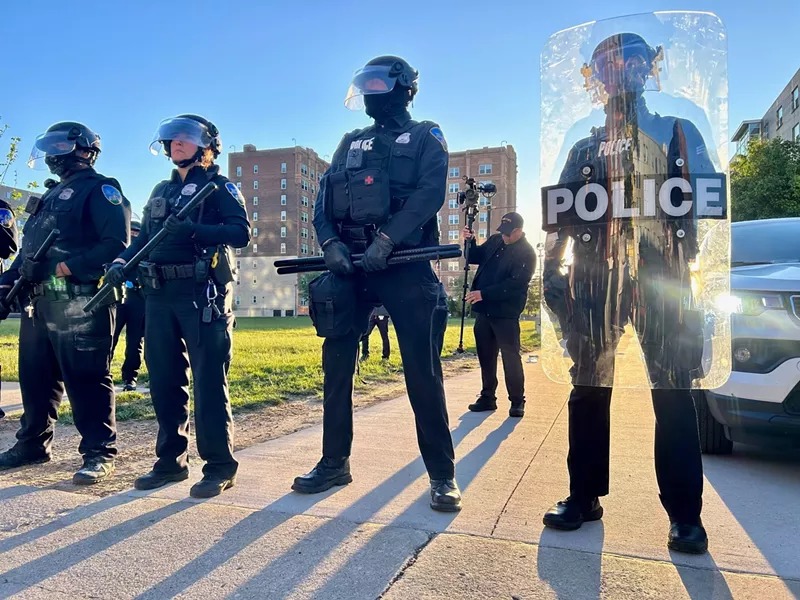
“Imagine sitting in your office at Wayne State University after having watched what happened at Harvard, Yale, and other universities and saying, ‘What I should do is the same absolutely stupid thing,’” a professor says. “Not only does Espy have vile political beliefs, but she isn’t learning what she’s seeing around the world. How dumb is she?”
Thousands of students have been arrested on campuses around the country in recent weeks for protesting Israel’s U.S.-backed brutality, and police have used aggressive tactics to crack down on dissent. At the University of Michigan last week, police in riot gear used batons and pepper spray to drive protesters back from their encampment before tossing tents, supplies, and students’ belongings into trash containers. The violent actions by police led to larger protests as supporters of free speech rights joined the activists to condemn the universities.
Instead of sitting down with students to discuss their demands, Espy chose violence and the suppression of free speech, faculty and staff members say.
“It doesn’t take a lot of research to understand that there is a better way to handle this,” a professor says. “There were no attempts to do this differently. And there have been multiple times when Espy deliberately misled her students and even misrepresented her own intentions to make it seem like she was going to bargain in good faith.”
Morhaf Al Achkar, professor of Oncology at the Wayne State University School of Medicine, says universities should be havens for free speech, and college leaders should encourage dialogue.
“When we are in our classrooms, we pose questions, and sometimes you are faced with silence,” Al Achkar, who is from Syria, says. “Now you have the students talking. And you have the community here. Let the community engage. Let the students deliberate. We support them and are behind them. This is a formative moment for every student here. And we stand behind it.”
The staff and faculty members say they’re proud of the students for having the courage to speak out.
“I am incredibly proud of them, and I am deeply inspired by their bravery,” Julia Yezbick, a professor in the Department of Communication, said three days before the encampment was raided. “Many of them are young, and they are very intelligent and so well spoken. And they have done their research, and they are standing firmly in what they believe. It’s incredible walking through camp because we see our students here, and they’re showing up.”
Another professor, who is a licensed mental health professional, says students have been dealing with so much anxiety and uncertainty over the past few years, from the mass shooting at Michigan State University and the COVID-19 pandemic to the violence against Palestinians.
“After going through all of that, they’re showing up here with bravery,” he says. “They are seeing everything that has been happening in Gaza over the last six months. They’ve gone through so much, and it’s just nauseating to think that they’re putting themselves in this position and the response is, again, more violence.”
Al Achkar says the violence against students will be “a tragic and dark stain in the history of this institution.”
Meanwhile on Thursday evening, dozens of activists gathered outside the jail to support the students who were arrested.
Powerful moment, those detained at Wayne State’s encampment walked out together as they held one another.
— Andrea May Sahouri (@andreamsahouri) May 30, 2024
Protestors cheered, ran to greet them. There were tears of joy. pic.twitter.com/GR7KfHDwcQ
In a statement Thursday, Espy defended the raid, claiming the encampment was unsafe and scaring other students.
“At Wayne State, we live by an unwavering set of values — including collaboration, integrity, diversity and inclusion — as well as a commitment to safety, security and equity for our entire campus community,” Espy said. “As president, I have a responsibility to uphold these values for all to live, learn and work.”
Espy added, “Since the encampment was established on May 23, it presented legal, health and safety, and operational challenges for our community. University leadership repeatedly engaged with occupants of the encampment.”
After this article was published, WSU issued the following statement:
At Wayne State University, we take pride in being the region’s premier public urban research university. We strive to make our campus welcoming, safe and inclusive for all and our focus will always be the success of our students. Every student deserves full access to our world-class education.
As our President Kimberly Andrews Espy works to accomplish these goals, the WSU Board of Governors stands with her and supports her. Recent events on the university campus, including yesterday’s removal of the encampment, have been difficult for many. From attempting resolution through dialogue to safely clearing the encampment, university leadership’s decisions have been thoughtful and deliberate.
We look forward to continuing to work together to help ensure the success of all our students.

